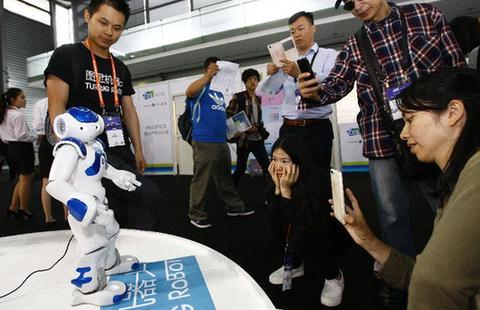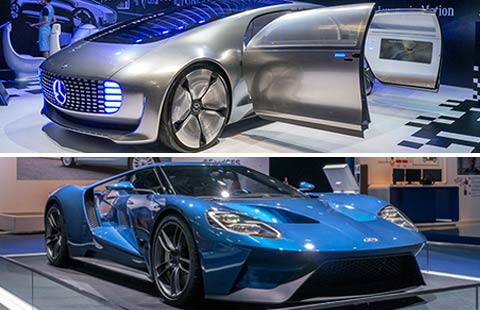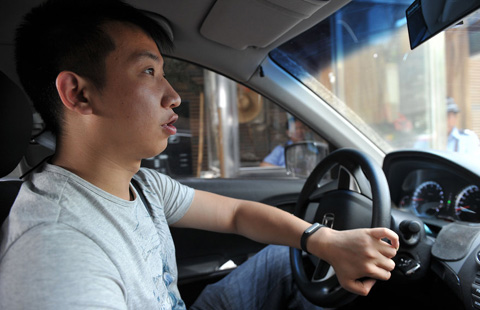Lenovo works its magic with consumers, partners
By GAO YUAN (China Daily) Updated: 2015-05-29 07:29
|
 |
|
A visitor takes a close look at the smartwatch unveiled by Lenovo Group Ltd in Beijing, May 28, 2015. Executives from technology giants such as Microsoft Corp and Baidu Inc attended the global technology event. [Photo/China Daily] |
Smartphones with a laser keyboard, smartwatches that have a second screen to show panoramic images and holographic lenses that bring users anywhere in the world-all developments by Lenovo Group Ltd which showed off its latest technologies on Thursday intended to wow consumers.
The world's largest personal computer maker sees itself as an innovative pioneer that sets the standards for Chinese technology companies, and it is betting on cool technologies and fancy gadgets to win customers from Apple Inc, Xiaomi Corp and other industry stars.
And with that firmly in mind, Lenovo held first global technology event, with Chief Executive Yang Yuanqing unveiling parts of the company's development inventory to an audience that included industry tycoons.
"Innovations in hardware, connectivity technologies and IT infrastructure are key areas for Lenovo to invest in the future," Yang said, as he pledged a deeper collaboration with world's top component vendors, software producers and Internet firms to boost innovation together.
Intel Corp Chief Executive Officer Brian Krzanich, Microsoft Corp CEO Satya Nadella and Baidu Inc's founder and CEO Robin Li were among Yang's guests.
Krzanich and Nadella expressed willingness to have wider partnerships with Lenovo when it comes to producing hardware and services for Windows 10.
The most exciting product on display at the event was Magic View, a concept dual-screen wearable that can reflect videos and images directly on a user's eye using a built-in micro projector.
The Magic View has a round dial similar to the Moto 360-a strong challenger to the Apple Watch-made by Lenovo's newly acquired subsidiary, Motorola Mobility.
Magic View can track steps, receive news alerts and read messages. Lenovo has filed more than 100 patents for the device.
In another demo, Yang showcased a smartphone/laser projector combination that allows users to send messages using a virtual keyboard displayed on a desk or even a wall. The device, no bigger than a traditional pamphlet, can also project screen images on any surface bigger in size.
Peter Hortensius, chief technology officer of Lenovo, said the technology is addressing a major flaw of today's smartphones: the screens are too small.
"We invent new products to catch the pain points customers are facing. Good devices are engineered to address problems," he said.
It was the first time for Lenovo to unveil numerous prototypes, work-in-progress technologies and concepts for next-generation consumer electronics at the same time.
By hosting a forward-looking technology event, Yang said the company is looking to build a "younger, more vibrant" brand image among users born after the 1990s.
More than 30 years after its establishment, Lenovo is finding itself losing fan base to emerging rivals such as Xiaomi. The company aims for a bigger share in the high-end handset segment.
- Direct flights to link Guangzhou, Nairobi
- Chinese banks' asset custody businesses thrive
- China to turn TV networks into home information center
- Growing the link between government and market forces
- Affordability to boost retail trade prospects
- Looking beyond the realms of realty
- Municipality's plan will boost economic relations with Beijing
- Foreign firms to expand business reach in Tianjin

















